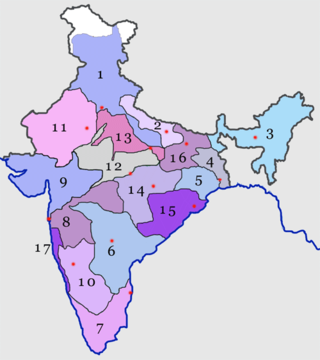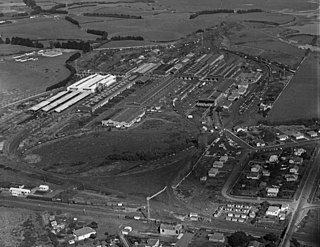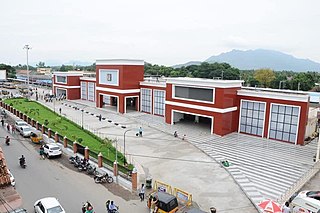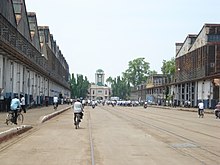
The North Tyneside Steam Railway and Stephenson Steam Railway are visitor attractions in North Shields, North East England. The museum and railway workshops share a building on Middle Engine Lane adjacent to the Silverlink Retail Park. The railway is a standard gauge line, running south for 2 miles (3.2 km) from the museum to Percy Main. The railway is operated by the North Tyneside Steam Railway Association (NTSRA). The museum is managed by Tyne and Wear Archives and Museums on behalf of North Tyneside Council.

The Northeast Frontier Railway is one of the 19 railway zones of the Indian Railways. It is headquartered in Maligaon, Guwahati in the state of Assam, and responsible for operation and expansion of rail network all across Northeastern states and some districts of eastern Bihar and northern West Bengal.

The Nilgiri Mountain Railway (NMR), colloquially called the "Toy Train" by locals is a 1,000 mmmetre gauge railway in Nilgiris district, Tamil Nadu, India, built by the British in 1908. The railway is operated by the Southern Railway and is the only rack railway in India.

Southern Railway (SR) is one of the eighteen zones of Indian Railways. It is headquartered at Chennai and operates across the states of Tamil Nadu, Kerala, Andhra Pradesh and the union territory of Puducherry. The origin of the Southern Railway can be traced back to the Madras Railway formed in 1845. Southern Railway was created on 14 April 1951 by merging three state railways, namely, the Madras and Southern Mahratta Railway, the South Indian Railway Company, and the Mysore State Railway and became the first railway zone created in newly formed India. Southern Railway maintains about 5,081 km (3,157 mi) of railway lines and operates 727 railway stations. It has the distinction of operating the first railway line in India, which opened for traffic from Redhills to Chindadripettai in Madras on 12 September 1836.

Swindon Works was opened by the Great Western Railway in 1843 in Swindon, Wiltshire, England. It served as the principal west England maintenance centre until closed in 1986.

Jamalpur Locomotive Workshop is a railway workshop established on February 8, 1862, as the first fully-fledged railway workshop facility in India. It was started by the East Indian Railway Company (EIR) as a result of the so-called "Railway Age" in India, which began in 1854.

Perambur Loco Works is a suburban railway station in the Perambur area of the city of Chennai, in Tamil Nadu, in India. It serves the Integral Coach Factory (ICF) that is one of the largest railroad carriage and locomotive manufacturers in the world. The station serves growing areas like Periyar Nagar and Jawahar Nagar localities in the north-west corner of Chennai. The station has an elevation of 7.01 m above sea level.

Perambur Carriage Works railway station is a suburban railway station less than a kilometre from the Perambur railway station in Chennai, Tamil Nadu, India. The station has an elevation of 7.16 m above sea level. Mainly POH and IOH of all type of passenger coaches are undertaken here. The railway department has many facilities around this station, including a school, and an indoor sporting facility.
The ALCO DL560C is a series of diesel-electric locomotive with AC electric transmission designed by the American Locomotive Company and produced under license by Banaras Locomotive Works (BLW) Varanasi, India for Indian Railways as their classes WDM-2, WDM-3A/2C, WDM-3D and WDG-3A for operation in India. The locomotive is fitted with a 16-cylinder ALCO 251 B, C diesel engine. In the early 1960s Indian Railways needed a reliable diesel workhorse to gradually replace its steam locomotive fleet. Equal numbers of ALCO's DL560C and EMD's G16 were chosen for trials. More locomotives of each of these were purchased for more trials. Indian Railways was keen on producing these locomotives in the country rather than depending on imports. EMD did not agree for a Transfer-of-Technology, while ALCO did. Thus ALCO DL560C was chosen for the job due to its easy maintenance, reliability and simple operation. And from then on vast numbers of this loco in different configurations have been produced and remain the main diesel traction power of Indian Railways.

Otahuhu Railway Workshops were a major rolling stock construction, maintenance and repair facility operated by the New Zealand Railways Department (NZR), in the south Auckland suburb of Ōtāhuhu in New Zealand's North Island. The workshops were opened in 1928 and were closed in 1992 as part of a rationalisation of workshop facilities throughout the country.

The Cardiff Locomotive Workshops is a rail yard and rolling stock facility located between Cockle Creek and Cardiff stations near Newcastle, on the Main North railway line in New South Wales, Australia.

The X class is a metre gauge 0-8-2RT rack and pinion compound locomotive used by the Nilgiri Mountain Railway in the Nilgiri Hills of southern India. They are used on the 28-kilometre-long (17 mi) section between Coonoor and Mettupalayam, where the line reaches a gradient of 8%. The railway uses the Abt system on these steep sections. The locomotives have two high-pressure and two low-pressure cylinders, located outside of their frames. The low-pressure cylinders drive the rack gears, and are positioned above the two main high-pressure cylinders, which drive the main wheels.
The Kanchrapara Railway Workshop is one of the major workshops of Indian Railways, and is located in the Sealdah division of the Eastern Railway zone. It is divided into two complexes — Loco Complex and Carriage Complex. It caters to the major overhauling of a large product mix of IR, including locomotives, ICF Coaches, EMUs, MEMUs, DEMUs, Tower Cars, etc. Its mention can be found in Satyajit Ray's short story "Patol Babu Superstar", which was also included in the Class 10 English Communicative Curriculum of the CBSE.

The Chennai Central – Bangalore City line is an electrified railway double line which connects Chennai and Bengaluru, the two largest cities in South India. It is officially known as Puratchi Thalaivar Dr. M.G. Ramachandran Central Railway Station–Krantivira Sangolli Rayanna line, and earlier known as Madras–Bangalore line.

Diesel Loco Shed, Golden Rock is an engine shed located in Golden Rock, Tiruchirappalli, Tamil Nadu in India. It is located north of Golden Rock railway station, falling under Tiruchirappalli railway division. It is the largest of the four locomotive sheds under the Southern Railway zone of Indian Railways.

The Jaipur–Ahmedabad line connects Jaipur, the capital of Rajasthan to Ahmedabad, the largest city of Gujarat in India. It is present on Ahmedabad–Delhi main line. Swarna Jayanti Rajdhani Express is the fastest train in this route.

Salem division is one of the six divisions of Southern Railway zone. Its headquarters is at Salem, Tamil Nadu.

Diesel Loco Shed, Ernakulam (Code:ERSX) is a motive power depot performing locomotive maintenance and repair facility for diesel locomotives of the Indian Railways, located at Ernakulam Junction (ERS) of the Southern Railway zone in the city of Kochi, Kerala. It is one of the four diesel loco sheds of the Southern Railway, the others being at Tondiarpet (TNP) at Chennai, Erode (ED) and Golden Rock (GOC) at Trichy and the only locomotive shed in Kerala and the southernmost loco shed in India. Although it is in Kerala, its locomotives were mainly used in Goa and Maharashtra, and very rarely near the shed for passenger trains.

Diesel Loco Shed, Tondiarpet is a motive power depot performing locomotive maintenance and repair facility for diesel locomotives of the Indian Railways. It is located near Tondiarpet railway station (TNP) of the Southern Railway zone in the city of Chennai, Tamil Nadu and is one of the four diesel loco sheds of the Southern Railway, the others being at Ernakulam (ERS) at Kochi, Erode (ED) and Golden Rock (GOC) at Trichy.




















